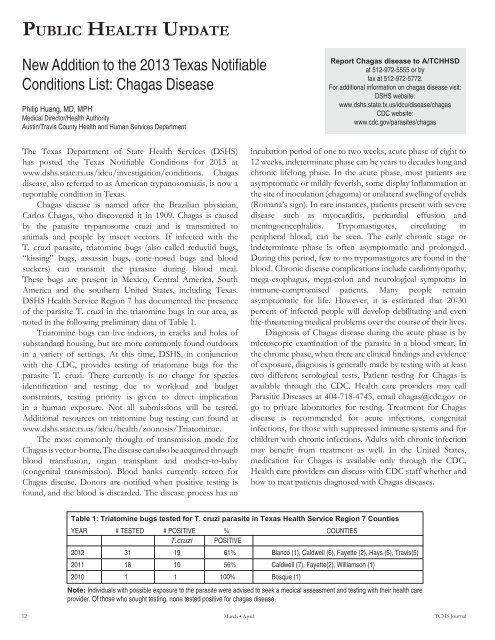TCMS
TCMS
TCMS
Create successful ePaper yourself
Turn your PDF publications into a flip-book with our unique Google optimized e-Paper software.
PUBLIC HEALTH UPDATE<br />
New Addition to the 2013 Texas Notifi able<br />
Conditions List: Chagas Disease<br />
Philip Huang, MD, MPH<br />
Medical Director/Health Authority<br />
Austin/Travis County Health and Human Services Department<br />
The Texas Department of State Health Services (DSHS)<br />
has posted the Texas Notifi able Conditions for 2013 at<br />
www.dshs.state.tx.us/idcu/investigation/conditions. Chagas<br />
disease, also referred to as American trypanosomiasis, is now a<br />
reportable condition in Texas.<br />
Chagas disease is named after the Brazilian physician,<br />
Carlos Chagas, who discovered it in 1909. Chagas is caused<br />
by the parasite trypanosome cruzi and is transmitted to<br />
animals and people by insect vectors. If infected with the<br />
T. cruzi parasite, triatomine bugs (also called reduviid bugs,<br />
“kissing” bugs, assassin bugs, cone-nosed bugs and blood<br />
suckers) can transmit the parasite during blood meal.<br />
These bugs are present in Mexico, Central America, South<br />
America and the southern United States, including Texas.<br />
DSHS Health Service Region 7 has documented the presence<br />
of the parasite T. cruzi in the triatomine bugs in our area, as<br />
noted in the following preliminary data of Table 1.<br />
Triatomine bugs can live indoors, in cracks and holes of<br />
substandard housing, but are more commonly found outdoors<br />
in a variety of settings. At this time, DSHS, in conjunction<br />
with the CDC, provides testing of triatomine bugs for the<br />
parasite T. cruzi. There currently is no charge for species<br />
identifi cation and testing; due to workload and budget<br />
constraints, testing priority is given to direct implication<br />
in a human exposure. Not all submissions will be tested.<br />
Additional resources on triatomine bug testing can found at<br />
www.dshs.state.tx.us/idcu/health/zoonosis/Triatominae.<br />
The most commonly thought of transmission mode for<br />
Chagas is vector-borne. The disease can also be acquired through<br />
blood transfusion, organ transplant and mother-to-baby<br />
(congenital transmission). Blood banks currently screen for<br />
Chagas disease. Donors are notifi ed when positive testing is<br />
found, and the blood is discarded. The disease process has an<br />
Report Chagas disease to A/TCHHSD<br />
at 512-972-5555 or by<br />
fax at 512-972-5772.<br />
For additional information on chagas disease visit:<br />
DSHS website:<br />
www.dshs.state.tx.us/idcu/disease/chagas<br />
CDC website:<br />
www.cdc.gov/parasites/chagas<br />
incubation period of one to two weeks, acute phase of eight to<br />
12 weeks, indeterminate phase can be years to decades long and<br />
chronic lifelong phase. In the acute phase, most patients are<br />
asymptomatic or mildly feverish, some display infl ammation at<br />
the site of inoculation (chagoma) or unilateral swelling of eyelids<br />
(Romana’s sign). In rare instances, patients present with severe<br />
disease such as myocarditis, pericardial effusion and<br />
meningoencephalitis. Trypomastigotes, circulating in<br />
peripheral blood, can be seen. The early chronic stage or<br />
indeterminate phase is often asymptomatic and prolonged.<br />
During this period, few to no trypomastigotes are found in the<br />
blood. Chronic disease complications include cardiomyopathy,<br />
mega-esophagus, mega-colon and neurological symptoms in<br />
immune-compromised patients. Many people remain<br />
asymptomatic for life. However, it is estimated that 20-30<br />
percent of infected people will develop debilitating and even<br />
life-threatening medical problems over the course of their lives.<br />
Diagnosis of Chagas disease during the acute phase is by<br />
microscopic examination of the parasite in a blood smear. In<br />
the chronic phase, when there are clinical fi ndings and evidence<br />
of exposure, diagnosis is generally made by testing with at least<br />
two different serological tests. Patient testing for Chagas is<br />
available through the CDC. Health care providers may call<br />
Parasitic Diseases at 404-718-4745, email chagas@cdc.gov or<br />
go to private laboratories for testing. Treatment for Chagas<br />
disease is recommended for acute infections, congenital<br />
infections, for those with suppressed immune systems and for<br />
children with chronic infections. Adults with chronic infection<br />
may benefi t from treatment as well. In the United States,<br />
medication for Chagas is available only through the CDC.<br />
Health care providers can discuss with CDC staff whether and<br />
how to treat patients diagnosed with Chagas diseases.<br />
Table 1: Triatomine bugs tested for T. cruzi parasite in Texas Health Service Region 7 Counties<br />
YEAR # TESTED # POSITIVE % COUNTIES<br />
T.cruzi POSITIVE<br />
2012 31 19 61% Blanco (1), Caldwell (6), Fayette (2), Hays (5), Travis(5)<br />
2011 18 10 56% Caldwell (7), Fayette(2), Williamson (1)<br />
2010 1 1 100% Bosque (1)<br />
Note: Individuals with possible exposure to the parasite were advised to seek a medical assessment and testing with their health care<br />
provider. Of those who sought testing, none tested positive for chagas disease.<br />
12 March • April<br />
<strong>TCMS</strong> Journal


